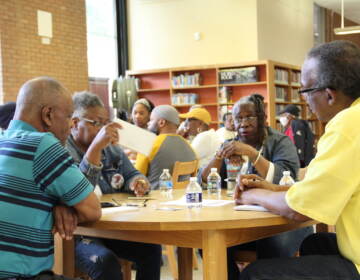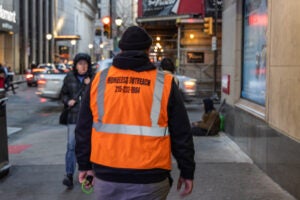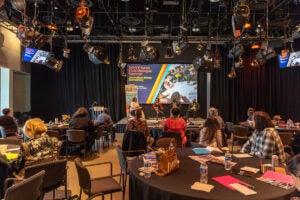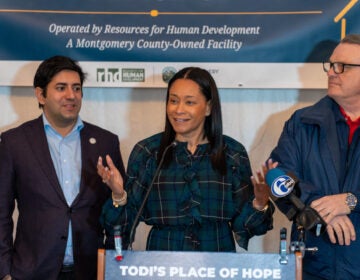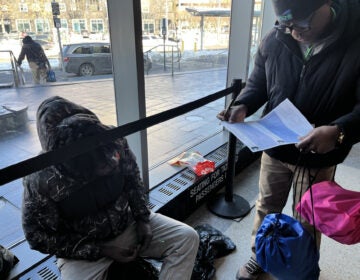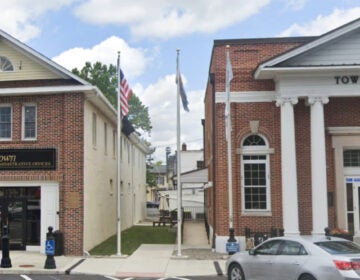Youth homelessness is a community responsibility, Northeast Philly residents say in latest Bridging Blocks event
The nearly two-hour conversation centered on youth homelessness — a growing problem in the region, according to recent city data.
Listen 1:10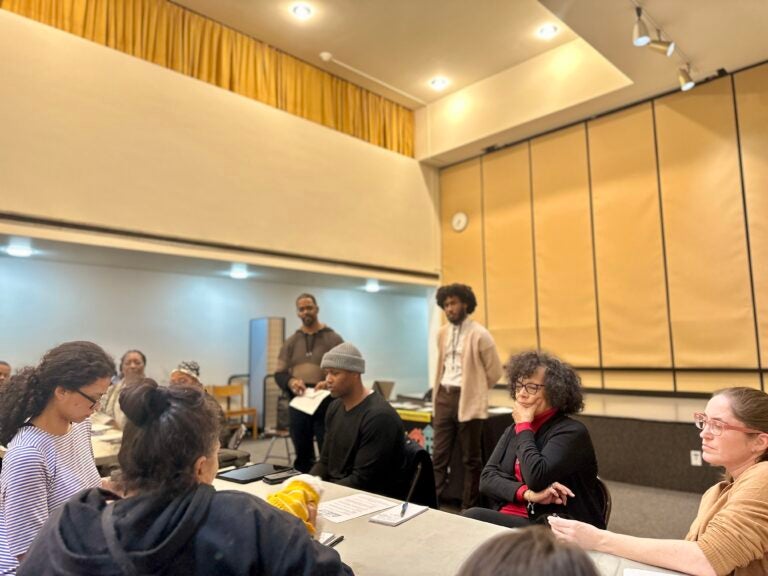
Attendees are locked in during the 15-minute discussion portion of WHYY's Building Blocks event on youth homelessness, hosted by manager of community engagement Eric Marsh Sr. and moderated by reporter Kenny Cooper. (Vicky Diaz-Camacho/WHYY)
From Philly and the Pa. suburbs to South Jersey and Delaware, what would you like WHYY News to cover? Let us know!
Almost 20 people filed into Philadelphia’s Northeast Regional Library Monday night, settling in their seats for the conversation to begin.
The latest WHYY Bridging Blocks partnered with the Free Library of Philadelphia to host Northeast residents. The nearly two-hour conversation centered on youth homelessness — a growing problem in the region, according to recent city data.
Of people who experience homelessness in Philly, more than 17% are children under the age of 18, and over 8% are youth ages 18 to 24, according to the city’s 2023 Point-in-Time Count. But advocates say that does not paint the full picture. Those figures do not count young people sleeping on someone’s couch, or those the HUD’s mandated survey did not see on Philly’s streets.
Homelessness among those high school- and college-aged is a symptom of a larger problem, say advocates and those with lived experiences.
Some attendees pointed to rising housing costs. Developers are building more housing, but it isn’t affordable for people who need it most, they said. Others pointed to a lack of trust in how city government handles its funding and poorly funded local programs.
Then Bridging Blocks raised this question: “How has the homelessness crisis — youth homelessness in particular — evolved over your lifetime? How have perceptions changed?”
Retired school teachers, shelter executives and young community members chimed in one after another. The themes included generational poverty, lack of funding and a failure to follow-through with government programs.
“We don’t even have a reasonable shelter system for adults, much less for youth,” one unnamed attendee said, who shared they work in the child welfare system. “There’s a disconnect.”
Heads nodded and voices raised as the five groups bounced ideas off one another. There was a sense of urgency.
They outlined root causes of youth homelessness, such as cycles of family abuse, trauma, substance abuse and untreated mental health. It was personal for some, like Nicole Robinson who is now a case manager at a veteran’s organization.
“When you are in the home, you’re already going through trauma. The issue is once you’re out of the home,” Robinson said. ”You are re-traumatized over and over again. As a child that was in that particular system it is very hard to kind of navigate.”
To her, one longer-term solution is preventative care and intervention coupled with housing support.
“[Mental health] intervention is the best thing when you are looking for housing,” she added. “You need to pair those things so that the whole person is serviced, not just pieces of them.”
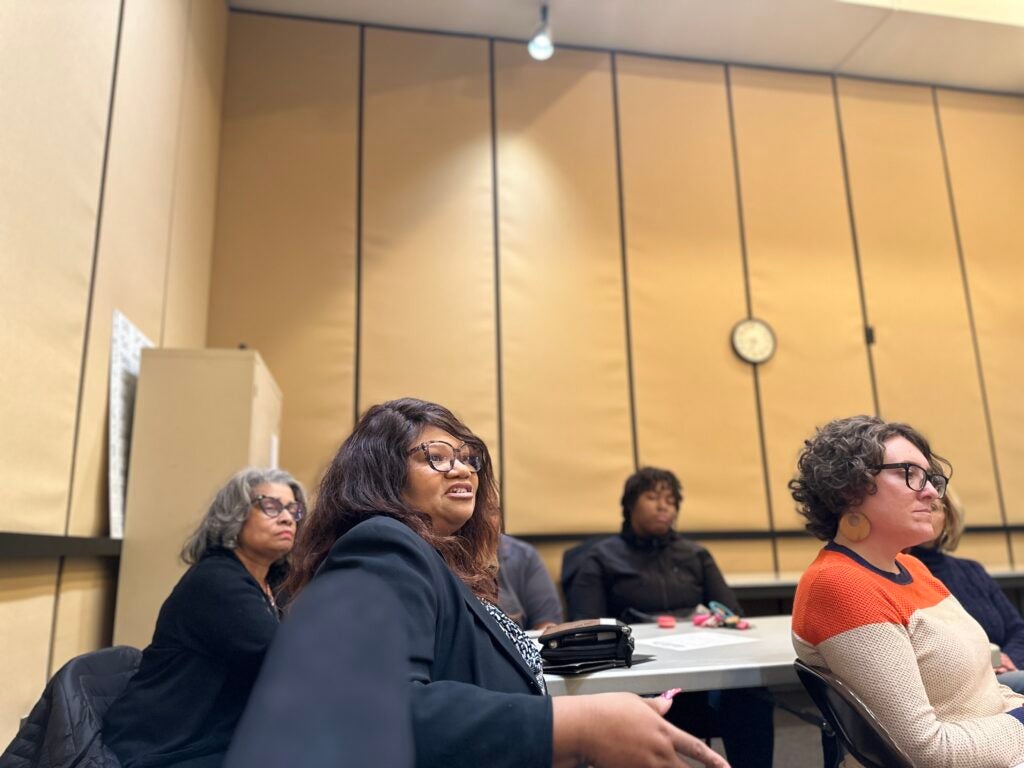
Community members like Neyda Rios have stepped up to the plate when government resources were not readily available for a child needing somewhere to sleep. She said she has a spare bed made in her daughter’s room and even space in her car.
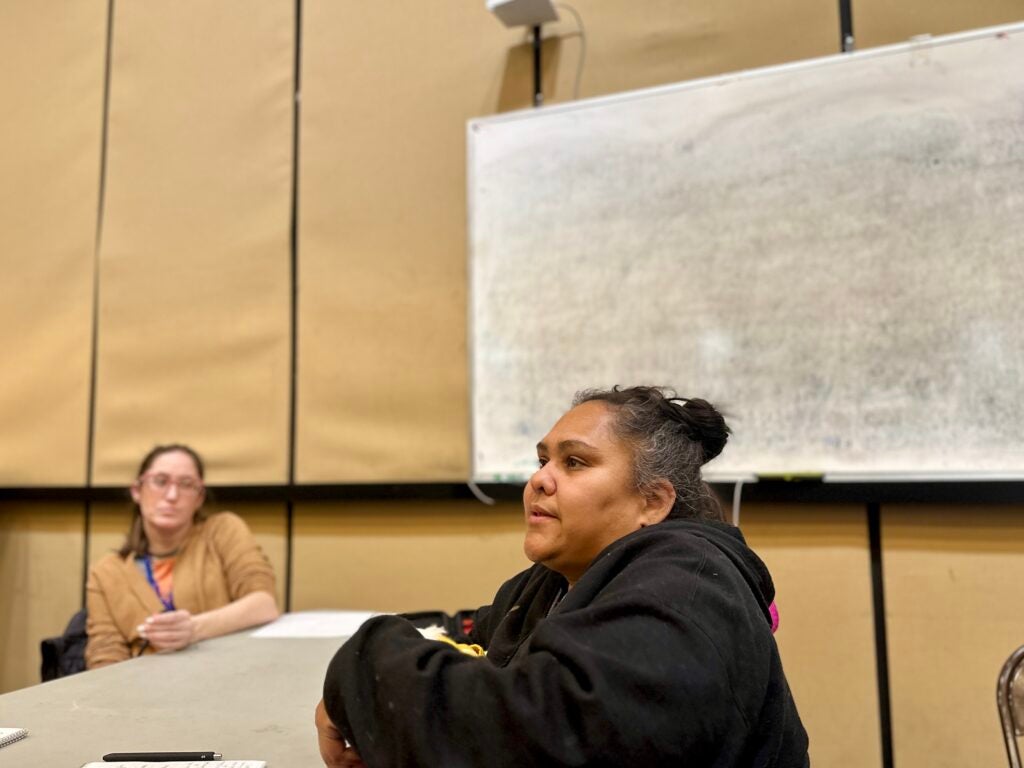
Young adults who have gone through the Department of Health and Human Services system and those who work for local government say resources are piecemeal. Nathaniel Walker saw firsthand how this perpetuates a generational cycle.
Walker founded the transitional shelter, Eternal Light of Hope and Mankind, to fill a void. He recalled a young lady he helped house 10 years ago.
“I remember her from her mother, who was homeless,” Walker described.
This young woman also had a child, which concerned him.
He added. “So she went from shelter as a child to an adult and now you look at … her child. Is that going to happen again? What’s in place so that doesn’t happen?”
Shirlana Dash, chief executive officer at Self Inc. said the onus is on individual social workers and caseworkers to make the right calls on where a child ought to be placed, whether that is with family or a vetted foster family. It starts with them but is a ripple effect.
What is often missing, she believes, is conviction and being the voice of reason.
“The work we do is hard,” Dash said.
Before she led one of the largest shelters in the city, Dash said she worked at DHS as a social worker for 25 years. She urged community members to hold systems like local government, like providers, accountable.
“Systems are imperfect. … It is the people who charge the government to do different,” she said. “The conviction starts first with a person, but then systematically, we all have to be a voice.”
The main theme of the night was a sense of community duty and filling in the gap when the city government does not.
“We got to stick together as a community and do things like this, come together more,” Rios said.”
Bridging Blocks is a monthly civic engagement program presented by the Free Library of Philadelphia and WHYY News. Major funding for Bridging Blocks is provided by a leadership gift from the Sutherland Family. The next event is on Jan. 30 at 5:30 p.m. at Cecil B Moore Library on housing.
Moving In or Pushed Out: A Conversation About Housing Access
Bridging Blocks is a WHYY and Free Library partnership fostering civil dialogue and understanding between diverse households. It is made possible thanks to the generous support of Fred and Barbara Sutherland.
WHYY is your source for fact-based, in-depth journalism and information. As a nonprofit organization, we rely on financial support from readers like you. Please give today.


